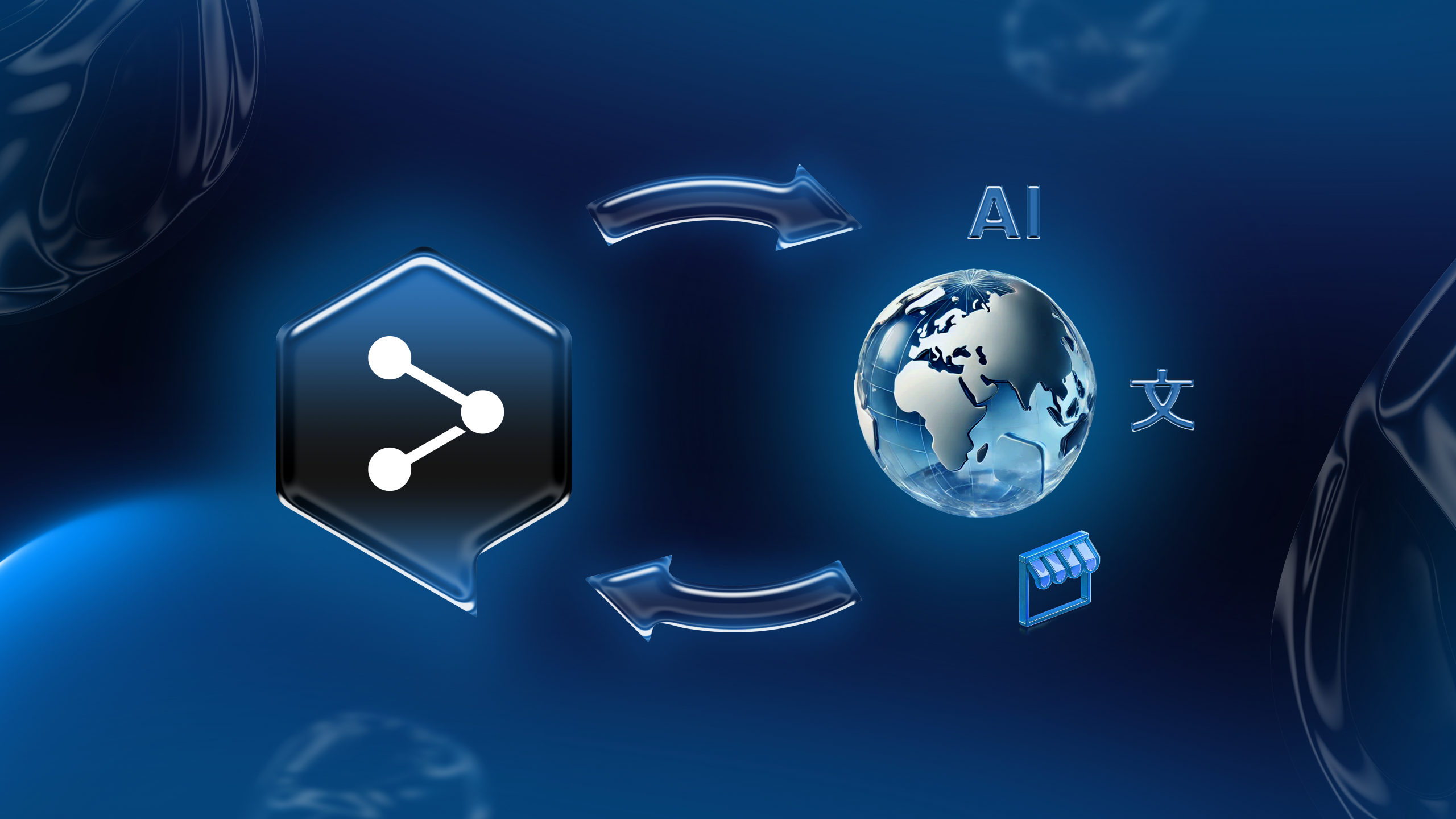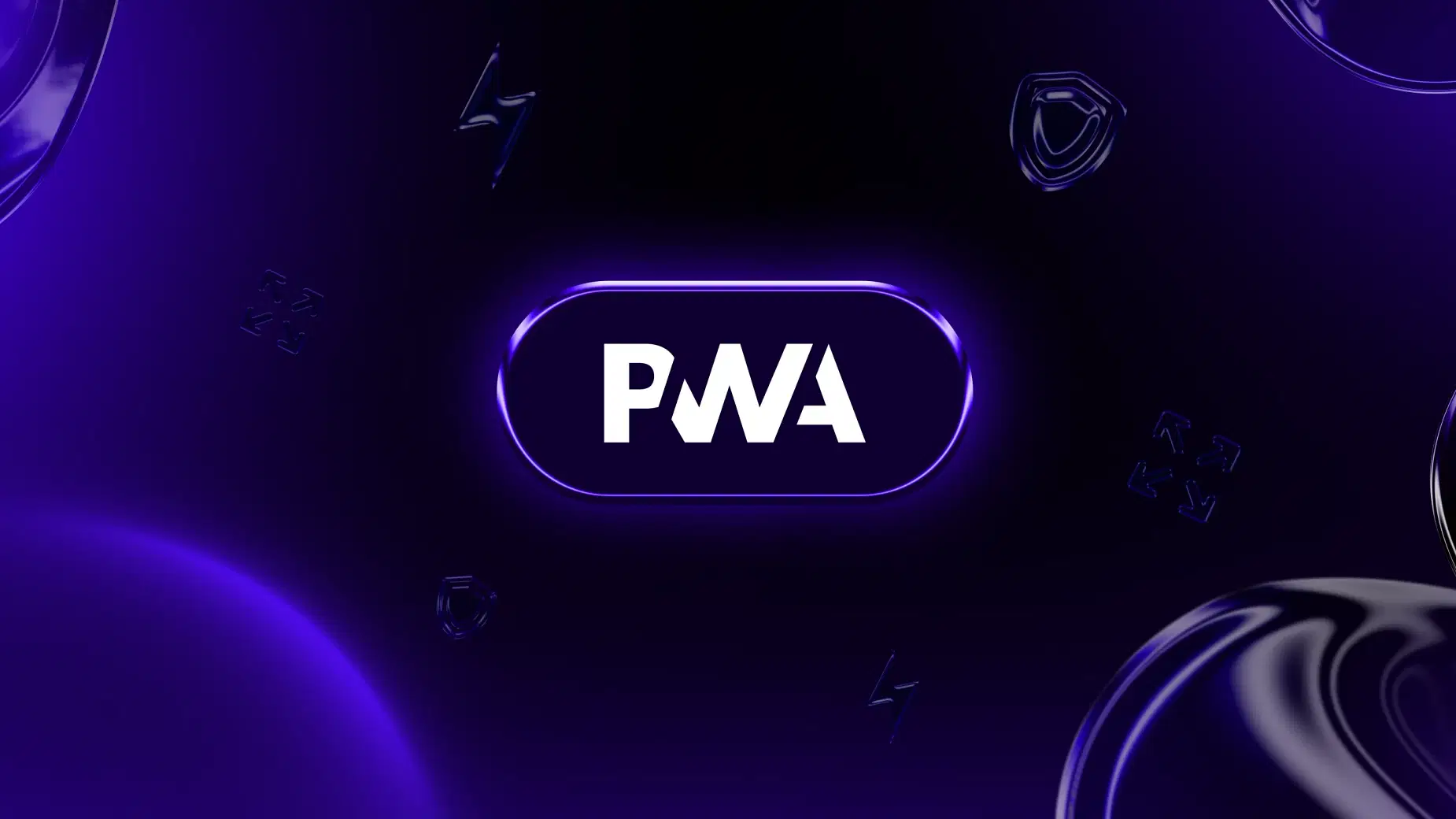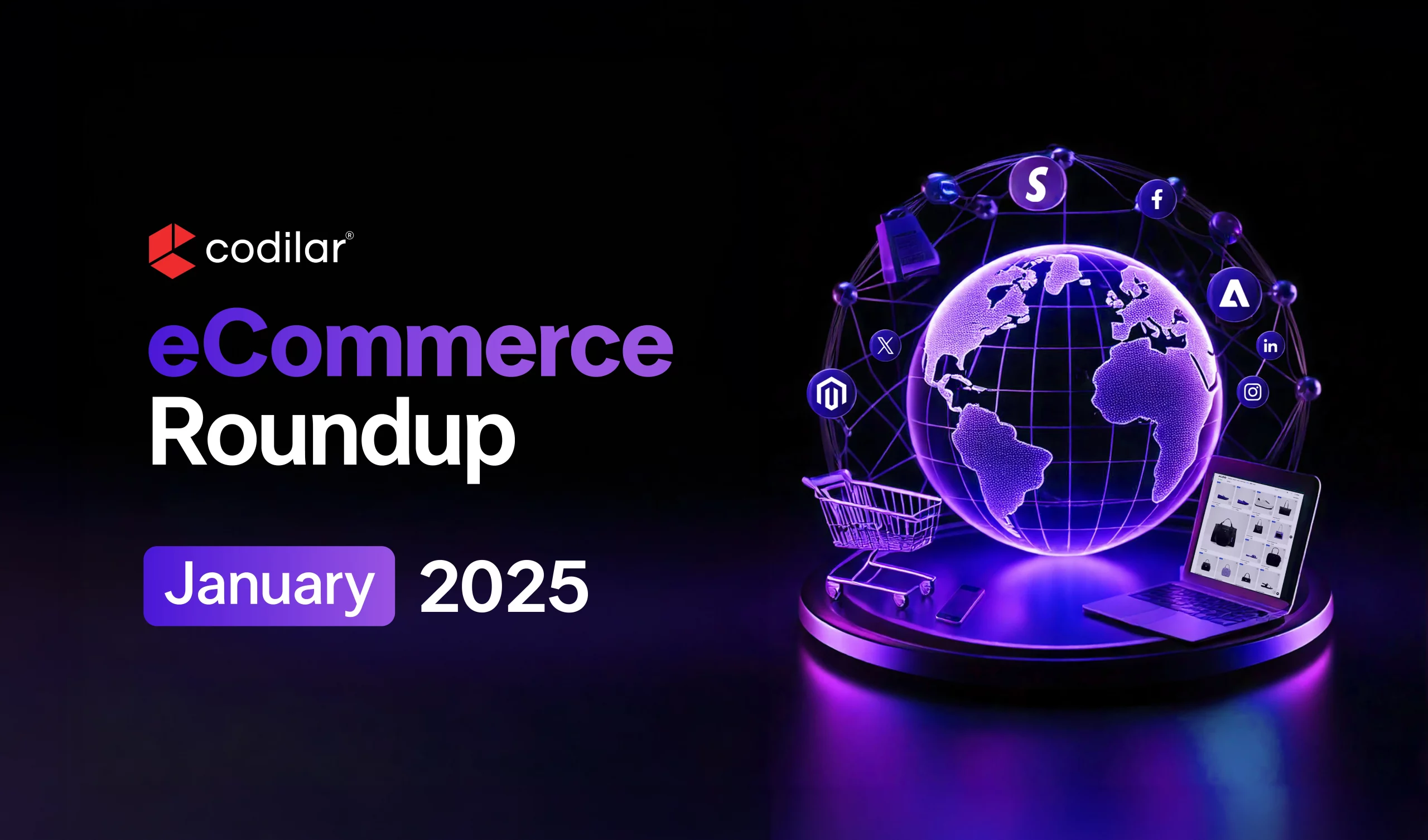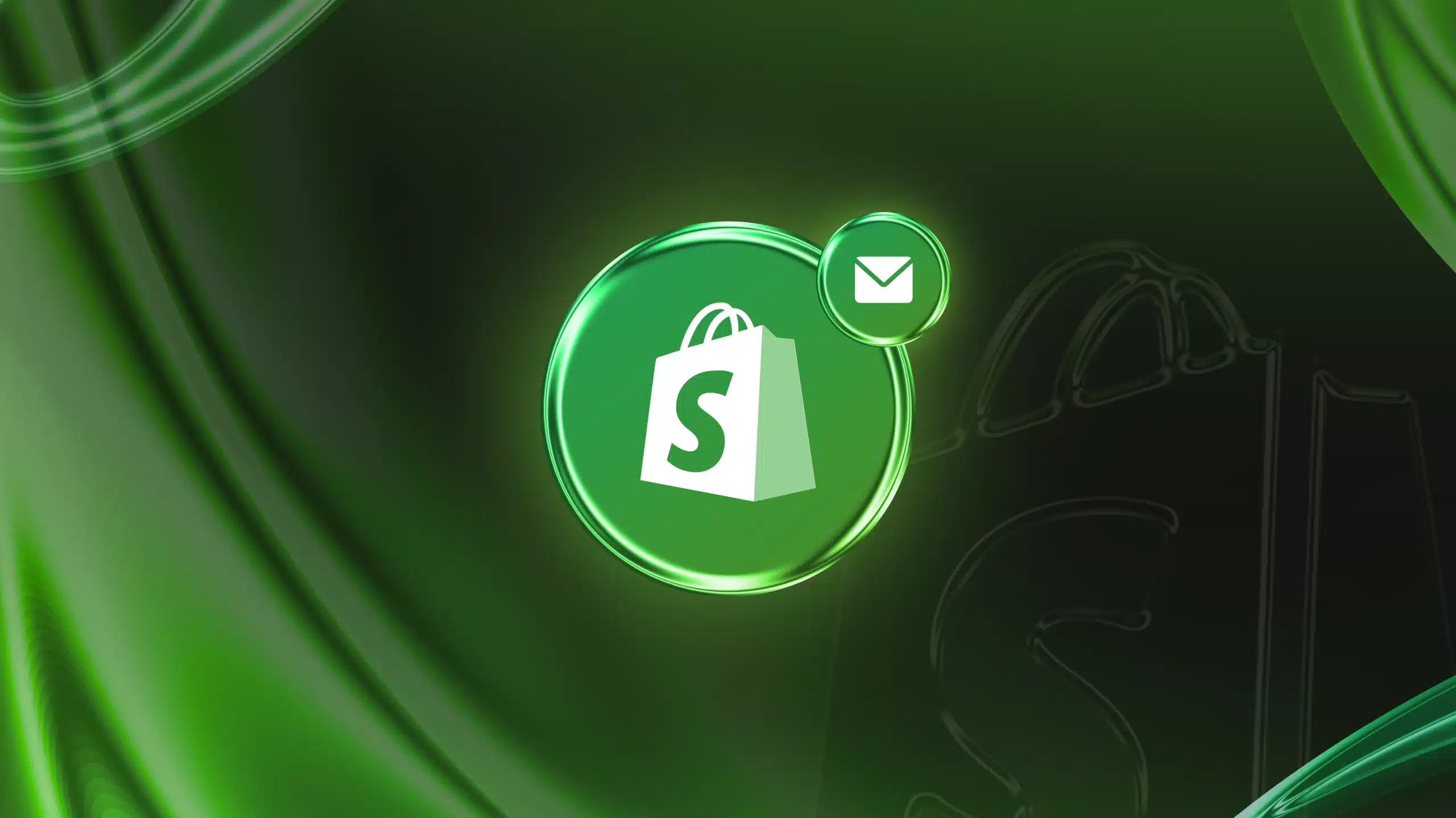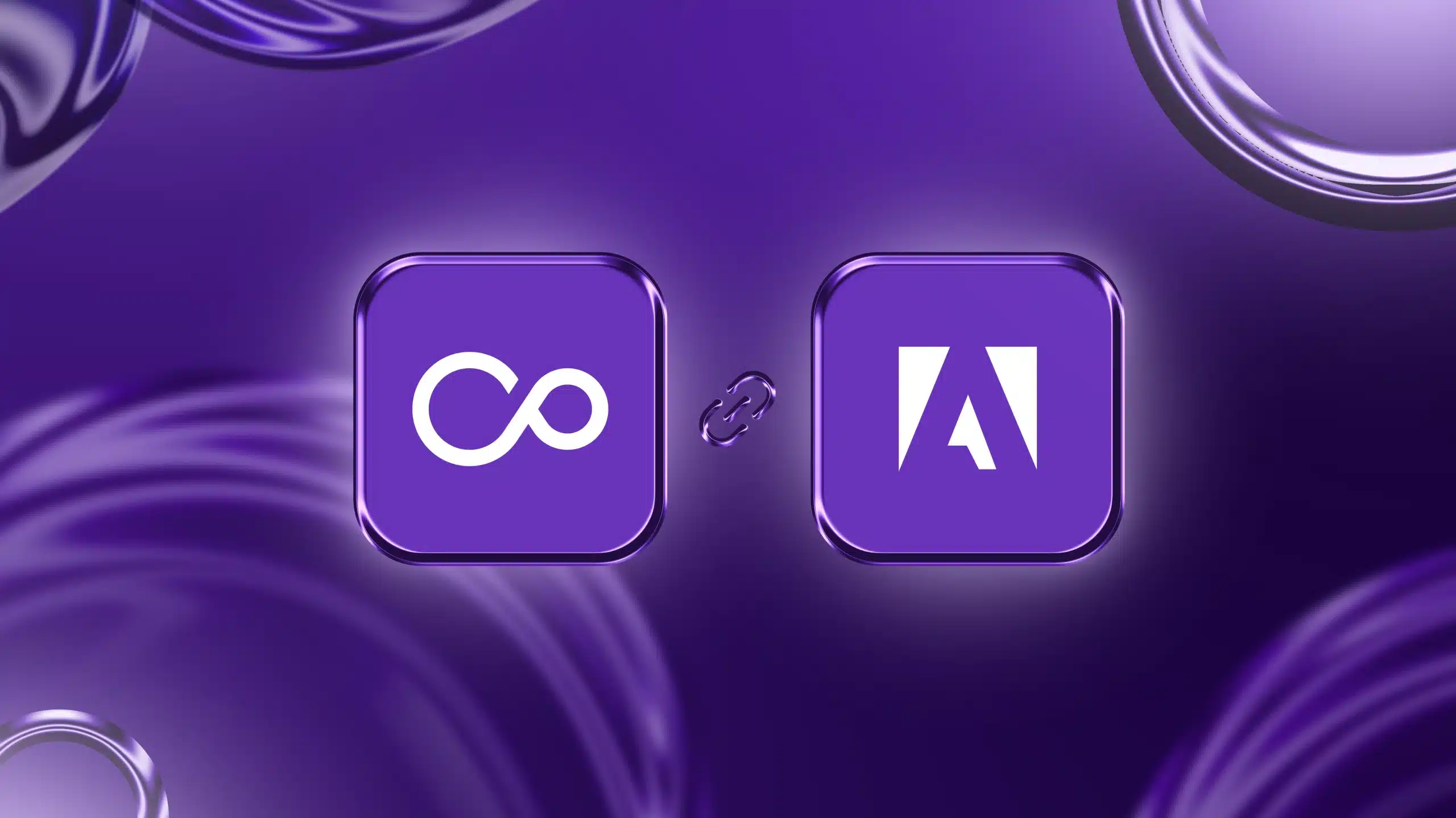Picking the right platform is crucial for any online store, whether they’re just starting or already in business. It’s a key factor in their success, since each platform has their own strength that caters to different business needs.
Magento and Shopify Plus are two big names, which provide strong features and advanced tools. You have to choose one over the other, based on your unique requirements.
But which one?
That’s why we’re here. We’ll break down everything from their features and scalability, to their performance, functionalities, support, and pricing. We’ll explain everything in detail to help you make a data-backed decision that adds to your ROI.
Shopify Plus
Being the enterprise-level version of Shopify, Shopify Plus has the plus in a true sense as the SaaS (Software as a Service) platform can empower businesses with a scalable, powerful, but simple platform. It offers a seamless ecosystem taking care of technical management and infrastructure.
Magento
Magento, aka Adobe Commerce, is another popular choice when it comes to building scalable, future-proof, and feature-rich eCommerce platforms. It’s an open-source platform that offers high-end customizations, advanced features, and exceptional scalability. However, if you’re not a coder or you don’t have Magento expertise, you have to hire a professional to manage your site.
Shopify Plus vs. Magento: An Overview
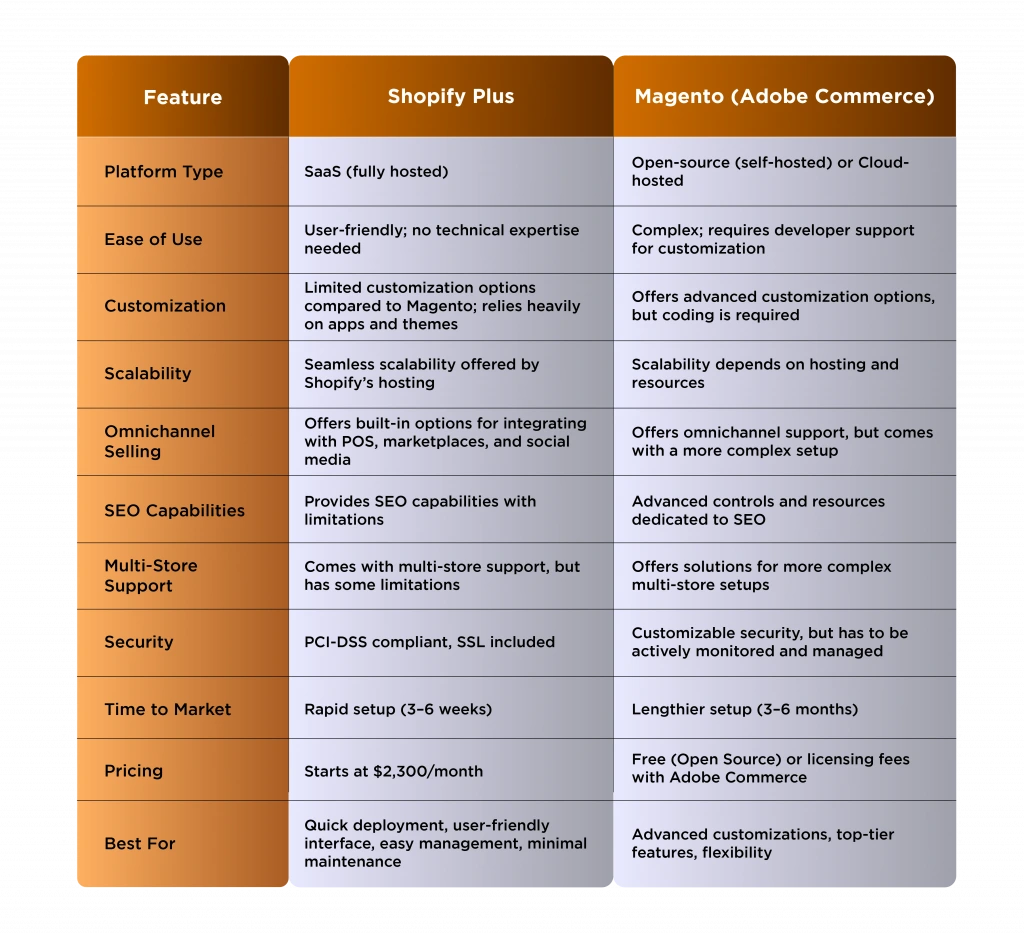
Key Comparison Points: Shopify Plus vs. Magento
Both platforms offer tremendous popularity when it comes to building top-tier eCommerce solutions. The choice heavily depends on your project requirements and business goals.
Ease of Use
Shopify Plus is undoubtedly one of the most beginner-friendly platforms to build your eCommerce store. With its simple interface, almost anyone can create and manage a store on Shopify Plus, leveraging the huge theme collection, built-in features, and easy-to-use dashboard.
On the other hand, being an open-source platform, Magento demands technical expertise to manage the stores. For a layman without prior knowledge of coding and managing Magento, handling the platform would pose a significant challenge.
Verdict: Shopify Plus is, hands down, the clear winner in this category as it’s built with ease of use in mind. However, if you want more complex customizations, Magento would be the way to go. However, you’ll need a dedicated tech partner.
Customization and Flexibility
The open-source framework of Magento allows it to offer unmatched customizations and flexibility to businesses. From creating customized checkout experiences to integrating tailored features, you can modify every aspect of your online store.
While Shopify Plus also offers customization options, the scopes are limited due to its closed ecosystem. You typically have to use third-party apps or themes to achieve customizations.
Verdict: If you want high-end customizations for your online store, Magento is a no-brainer choice. But if you need simplicity over flexibility, Shopify Plus is the smarter choice.
Scalability and Performance
Since the platform comes with a fully hosted infrastructure, it offers impeccable performance and unmatched uptime, even during peak periods, such as Cyber Mondays and Black Fridays.
The hosting and infrastructure heavily influence how scalable your Magento store is going to be. While Magento is more than capable of handling large volumes of traffic for enterprise-level businesses, it totally depends on your server quality and maintenance.
Verdict: Both Shopify Plus and Magento are highly scalable options for large businesses. However, while Shopify Plus comes with no additional overhead, Magento requires a powerful server, more resources, and technical expertise.
Omnichannel Capabilities
From POS systems to online marketplaces (eBay, Amazon, etc.) and social media platforms, Shopify Plus’s ability to seamlessly integrate with anything makes it an amazing choice for omnichannel retailing. With Shopify Plus, businesses can leverage a unified dashboard to manage multiple channels.
While omnichannel retailing can also be achieved with Magento, it often requires custom development and integrations, which add to the cost and complexity of the project.
Verdict: If you want a more straightforward, streamlined, and faster omnichannel experience, Shopify Plus is the ideal platform. But if you’re aiming at top-notch flexibility and customizations along with the omnichannel experience, you should pick Magento.
Pricing
- Shopify Plus: Starts at $2,300/month with variable transaction fees for 200 inventory locations and unlimited products.
- Magento: The open-source version of Magento is completely free, but you have to consider the additional costs, like hosting, development, and maintenance. However, there are some licensing fees involved in the premium versions of Adobe Commerce where you can get more advanced features and functionalities.
SEO and Marketing Tools
Magento stands out as one of the top choices for SEO. You have complete control over key elements, including sitemaps, URL structures, and metadata. If your business relies on organic traffic, Magento makes a wise choice.
While Shopify Plus includes powerful SEO tools and features, it does have some constraints. For instance, it has fixed URL structures. But, the platform’s app ecosystem provides effective marketing tools for analytics, email marketing, and paid campaigns.
Verdict: Shopify Plus works well for companies needing built-in marketing tools, but Magento stands out for those wanting top-notch SEO customizations.
Multi-Store Management
Shopify Plus lets you set up multiple stores, which benefits large businesses. However, you need a separate account for each store making things harder and slower for businesses running stores in different regions.
Magento stands out in handling multiple stores. Companies can control several stores from just one place, and the platform offers tools to manage currencies and languages. This helps businesses operating worldwide.
Verdict: Shopify Plus works well for simple setups. But when it comes to running complex operations with stores in different regions, Magento is the better choice.
Security and Compliance
With Shopify Plus, you don’t need to worry about security as the platform takes care of all security aspects, being a fully hosted solution. Not only does it deliver regular security updates, but the PCI-DSS-compliant platform comes with built-in SSL certificates too!
Magento also offers a boatload of security features and tools. But the store owner has to make sure those are incorporated and maintained properly, which includes ensuring PCI compliance, securing servers, and installing updates.
Verdict: While Shopify Plus comes with an industry-standard, out-of-the-box security package, Magento offers way more control but requires active management.
Time to Launch
With pre-built themes, apps, and fully hosted infrastructure, Shopify Plus is designed for rapid development, often enabling stores to go live within 3-6 weeks!
Magento, on the other hand, takes way more time to launch compared to Shopify Plus. This is simply due to the development and customizations required to build stores using Magento. While 3-6 months can be considered as a standardized launch time for Magento stores, the time can vary depending on the project’s complexity.
Verdict: If the time to launch is a priority, Shopify Plus is, hands down, the winner. While Magento sites take longer to launch, they also offer a more customized solution and targeted functionalities.
Shopify gives everyone in your business the power to work together smoothly, making it easy to launch fresh ideas fast. Whether teams want to create discounts, launch campaigns, tweak the website, or promote products, we make it a whole lot simpler. In contrast, Adobe Commerce is built primarily for developers, which can result in longer lead times and higher budgets for projects. With Shopify, you won’t need a developer for everything you try to do anymore.
Which Platform Should You Choose?
Choosing Shopify Plus or Magento is a matter of your requirements and goals.
Choose Shopify Plus if:
- You are looking for rapid deployment.
- You don’t need complex customizations and hyper-targeting.
- You want a user-friendly platform with lower maintenance costs.
- You want built-in omnichannel capabilities.
- You are looking for a predictable pricing model.
- You want industry-standard security without involving a tech team.
Choose Magento if:
- Flexibility and customization are something you cannot compromise on.
- You manage multiple stores across regions and need advanced capabilities.
- You need advanced multi-store and omnichannel capabilities.
- You want to get your hands on advanced SEO capabilities.
- You have a reliable Magento development team in your budget.
- You want cutting-edge security features in your store.
Conclusion
While both Magento and Shopify Plus are the industry-leading platforms for eCommerce development, they have different strengths and cater to different businesses. While Magento is an open-source platform, offering endless flexibility and customizations, given you have a team of experts managing the platform, Shopify Plus offers a fully hosted infrastructure, prebuilt themes, apps, and enterprise-level features in a fixed budget, while limiting on some advanced customizations.
Assess your business requirements, technical know-how, and budgetary constraints before picking one over the other. Remember, the right platform is the foundation of your eCommerce store’s success and growth.



